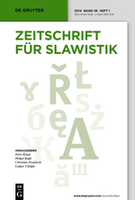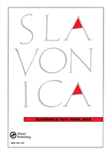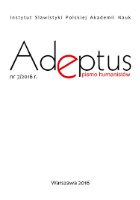
Mundo Eslavo-Journal of Slavic Studies
Scope & Guideline
Illuminating Contemporary Issues in Slavic Regions
Introduction
Aims and Scopes
- Interdisciplinary Examination of Estates:
The journal focuses on the cultural, literary, and historical significance of Russian estates, exploring their representation in literature and their socio-cultural implications. - Literary Analysis and Semiotics:
It employs literary analysis and semiotic approaches to study the representation of estates in Russian literature, often comparing them with European literary traditions. - Cultural and Historical Contextualization:
The journal places a strong emphasis on situating literary works within their cultural and historical contexts, particularly regarding the evolution of Russian estates from the 19th century to the contemporary period. - Focus on Notable Authors and Texts:
There is a consistent focus on notable Russian authors and their works, analyzing how they depict estates and their significance in shaping cultural narratives. - Sociolinguistic Studies:
The journal also addresses sociolinguistic aspects of Slavic languages, exploring language use and errors among speakers, particularly in educational contexts.
Trending and Emerging
- Revitalization of Estate Culture:
There is a growing interest in the cultural and literary significance of estates in Russian literature, particularly how they reflect social dynamics and historical changes. - Interdisciplinary Approaches:
The journal increasingly emphasizes interdisciplinary methodologies, integrating insights from history, sociology, and literary studies to enrich the analysis of estate-related themes. - Global Contextualization:
Recent papers have begun to contextualize Russian estate literature within a global framework, exploring its connections to other European literary traditions and cultural narratives. - Focus on Semiotics and Literary Landscapes:
An emerging trend is the exploration of semiotics in the representation of literary landscapes, particularly how physical spaces like estates shape narrative and theme. - Educational Linguistics and Language Errors:
Research focusing on linguistic aspects of Russian language education, including error analysis among learners, has gained traction, reflecting a need for practical applications in language teaching.
Declining or Waning
- General Historical Overviews:
Themes focused on broad overviews of Russian literature from various centuries have become less frequent, suggesting a move towards more specialized studies rather than comprehensive surveys. - Translation Studies:
Topics specifically centered on translation and translators in Russian literature, such as those addressing the works of individual authors or specific translation practices, have seen a decrease, indicating a potential waning interest in this area. - Cultural Comparisons Beyond Estates:
Comparative studies that explore cultural elements outside the context of estates and manors have diminished, indicating a narrowing of focus within the journal's thematic scope.
Similar Journals

ZEITSCHRIFT FUR SLAWISTIK
Innovating Perspectives in Slavic Cultural StudiesZEITSCHRIFT FUR SLAWISTIK, published by WALTER DE GRUYTER GMBH, is a renowned journal focusing on Slavic studies, encompassing various fields such as cultural studies, linguistics, and literary theory. With its ISSN 0044-3506, this distinguished journal has been a significant contribution to the academic community since its inception in 1956, continuing to disseminate valuable research until 2024. While maintaining a strong reputation within several academic categories, ZEITSCHRIFT FUR SLAWISTIK holds a Q3 ranking in Cultural Studies and Linguistics and Language, and a Q2 ranking in Literature and Literary Theory as of 2023. This positioning underscores the journal’s impact, particularly as it caters to an audience of researchers, professionals, and students invested in the rich tapestry of Slavic culture and language. Access to this journal is not open; however, its comprehensive articles are crucial for anyone aiming to explore and deepen their understanding of Slavic linguistic and literary traditions. The journal's work is essential in fostering cross-disciplinary dialogue and advancing scholarship in these vital areas.

SLAVONICA
Celebrating the Complexity of Slavic IdentitiesSLAVONICA is a distinguished academic journal dedicated to the exploration and analysis of Slavic studies, incorporating a wide array of cultural, historical, and linguistic perspectives. Published by Routledge Journals, Taylor & Francis Ltd, this journal serves as a critical platform for interdisciplinary scholarship, emphasizing the dynamic nature of Slavic cultures and languages. Though it currently does not offer Open Access, SLAVONICA is an important resource for researchers, professionals, and students seeking to engage with the latest academic discourse in the fields of Cultural Studies, History, Literature, and Linguistics, achieving a recognized place in the Q4 quartile across several categories as of 2023. With coverage spanning from 1994 to 2024, and its commitment to fostering academic inquiry, SLAVONICA plays a vital role in elevating the understanding of Slavic heritage and contemporary issues, making it essential reading for anyone interested in the complexities of this region.

Studia z Filologii Polskiej i Slowianskiej
Exploring the Depths of Slavic LinguisticsStudia z Filologii Polskiej i Slowianskiej is a prominent journal published by the Polish Academy of Sciences, Institute of Slavic Studies, focusing on the rich and diverse field of linguistics and language studies, particularly within the Slavic context. With the ISSN 0081-7090 and E-ISSN 2392-2435, this open-access journal has been a valuable resource for researchers, professionals, and students since its transition to an open-access model in 2014. It features rigorous peer-reviewed articles that contribute to the understanding of linguistic phenomena and cultural narratives across Slavic languages. Recognized within the Q3 quartile of linguistics and language in 2023, it ranks at the intersection of arts, humanities, and social sciences, providing insights that echo through disciplines such as sociolinguistics, psycholinguistics, and philology. In its ongoing publication trajectory from 2011 to 2023, Studia z Filologii Polskiej i Slowianskiej continues to foster academic discourse and collaboration, positioning itself as a key player in the global linguistic community.

Acta Baltico-Slavica
Unveiling the Depths of Slavic History and LiteratureActa Baltico-Slavica, an esteemed academic journal published by the Polish Academy of Sciences, Institute of Slavic Studies, serves as a vital platform for the exploration of Slavic cultures, languages, and historical narratives. Since its transition to Open Access in 2014, the journal has fostered inclusivity and accessibility, allowing researchers, professionals, and students to engage with cutting-edge scholarship in the fields of History, Linguistics and Language, and Literature and Literary Theory. With a commendable impact as indicated by its category quartile rankings (Q2 in History and Literature, Q3 in Linguistics), and Scopus rankings reflecting its significance within the academic community, Acta Baltico-Slavica not only contributes to the rich tapestry of scholarship surrounding the Baltic and Slavic regions but also encourages interdisciplinary dialogue. The journal’s commitment to advancing knowledge across its fields of study makes it a prominent destination for scholarly discourse and research inquiry.

SLAVIC AND EAST EUROPEAN JOURNAL
Unveiling the Richness of Eastern European CulturesThe Slavic and East European Journal (ISSN: 0037-6752) is a distinguished publication focused on the rich tapestry of Slavic and Eastern European cultures, languages, and literatures. Published by the Ohio State University’s Department of Slavic and East European Languages & Culture, this journal serves as a vital platform for scholars and researchers keen on exploring linguistic diversity and cultural heritage in these regions. With a wide-ranging scope, the journal addresses significant topics within Cultural Studies, Linguistics, and Literature, currently categorized in Q4 and Q3 quartiles across various academic metrics. Although it does not offer open access, anticipation is high among academics seeking to contribute or access cutting-edge research that pushes the boundaries of understanding these complex fields. As it converges from 2009 to 2024, the Slavic and East European Journal continues to uphold its commitment to academic excellence and community engagement, making it an essential resource for anyone dedicated to the study of Slavic and Eastern European traditions.

ZEITSCHRIFT FUR SLAVISCHE PHILOLOGIE
Advancing Understanding in Slavonic PhilologyZEITSCHRIFT FUR SLAVISCHE PHILOLOGIE is a pivotal journal in the field of Slavonic philology, published by Universitatsverlag C Winter Heidelberg GmbH. Renowned for its scholarly rigor and insightful contributions, this journal serves as a key platform for researchers, professionals, and students interested in Slavic languages and linguistics. Despite its classification as a traditional subscription journal, it has maintained a consistent presence in the academic community with contributions that enhance understanding of linguistic, cultural, and literary studies within the Slavic context. With an H-index reflecting its impact and relevance, the journal has historically been indexed in Scopus, ranking in the 34th and 33rd percentiles within the Arts and Humanities and Social Sciences categories, respectively. The journal has featured a range of scholarly articles from 2002 to 2017, providing a rich repository of knowledge for those dedicated to the study of Slavic languages. For any researcher aiming to delve into this dynamic field, ZEITSCHRIFT FUR SLAVISCHE PHILOLOGIE remains an essential resource.

Studia Litterarum
Exploring the Depths of Literary and Cultural NarrativesStudia Litterarum, published by the esteemed Russian Academy of Sciences at the A.M. Gorky Institute of World Literature, serves as a vital platform for the exploration and analysis of literature and cultural studies. With an ISSN of 2500-4247 and an E-ISSN of 2541-8564, this open access journal has been disseminating valuable research since 2016, reaching a global audience keen on advancing the understanding of literary theory and cultural narratives. Based in Moscow, Russia, the journal has achieved remarkable academic recognition, holding a Q2 classification in Cultural Studies and a prestigious Q1 tier in Literature and Literary Theory, as of 2023. Its Scopus rankings underscore its relevance, with a notable placement in the 51st percentile for literature and literary theory and 27th percentile for cultural studies. Studia Litterarum not only opens doors to scholarly dialogue but also enhances the visibility of contemporary literary scholarship, making it an essential read for researchers, professionals, and students alike seeking to deepen their understanding of the intricate dynamics within literature and cultural studies.

Slavia Meridionalis
Advancing interdisciplinary scholarship in Slavic studies.Slavia Meridionalis is a distinguished open-access journal published by the Polish Academy of Sciences, Institute of Slavic Studies, dedicated to advancing scholarly discourse in the fields of Anthropology, Cultural Studies, History, Linguistics and Language, and Literature and Literary Theory. With its ISSN 1233-6173 and E-ISSN 2392-2400, this journal has made significant strides in promoting research since its inception in 2014. Operating from Warsaw, Poland, Slavia Meridionalis aims to serve as a pivotal platform for researchers and students alike, fostering interdisciplinary collaboration and knowledge dissemination. The journal holds respectable rankings in its various categories, some achieving Q3 status, which reflects its commitment to quality scholarship within the academic community. By providing open access to its readership, Slavia Meridionalis ensures that pivotal research is readily available for the global audience, thus enhancing its relevance and impact across diverse fields.

RUSSKAIA LITERATURA
Unveiling the Rich Tapestry of Russian Literary TheoryRUSSKAIA LITERATURA, published by the esteemed Russian Academy of Sciences and the State Academy of Humanities (GAUGN), is a prominent journal dedicated to the exploration and analysis of Russian literature and literary theory. Since its inception in 2013, the journal has established itself within the academic community as a valuable resource for scholars and students alike, aiming to elevate discourse and critical thought in the field. Although currently categorized in Q4 of Literature and Literary Theory by Scopus, it plays a significant role in fostering a deeper understanding of Russian literary heritage. The journal's commitment to rigor and quality is underscored by its inclusion in internationally recognized databases, making it a relevant venue for contemporary literary scholarship. Researchers and practitioners in the field will find RUSSKAIA LITERATURA an indispensable tool to access vital knowledge and contribute to discussions that resonate within and beyond the Russian context.

Adeptus
Exploring Cultural Richness in Slavic ResearchAdeptus is a pioneering open-access journal published by the Polish Academy of Sciences, Institute of Slavic Studies, specializing in Slavic studies and cultural research. Since its inception in 2014, the journal has aimed to foster scholarly dialogue and advance knowledge across various disciplines related to Slavic languages, literature, history, and sociology. With an ISSN of 2300-0783, Adeptus has positioned itself as a vital resource for researchers, professionals, and students engaged in Slavic studies, offering a platform for high-quality, peer-reviewed articles that explore diverse topics within the field. The journal's open-access model promotes accessibility and dissemination of knowledge, making it a significant contributor to the academic landscape. Located in Warsaw, Poland, Adeptus continues to thrive as a key outlet for innovative research, inviting submissions that embody rigorous scholarship and insightful perspectives.